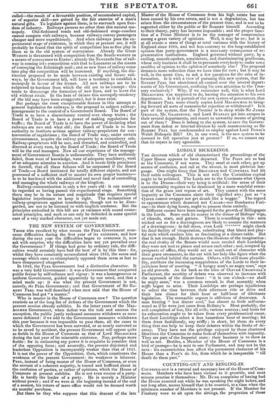LORDLY BICKERINGS.
THE decorum which of old characterized the proceedings of the Upper House appears to have departed. The Peers are as bad as the Commons, if not worse. They snarl at each other, get up scenes of confusion, and rail at the absent, in most plebeian lan- guage. One might fancy that BROUGHAM and CAMPBELL had bit their noble colleagues. This is not well : the Corinthian capital ought to be polished. The Lords are to the Commons what Opera is to the Drama—their very being is artificial: the sense of their conventionality requires to be deadened by a more watchful reten- tion of the grace and repose of art. They cannot with the same impunity as the Commons abate their dignified airs; just as "a Queen cannot swagger nor get drunk like a beggar." The regard to appearances which deserted not C.asAR—nor Bombastes Furi- oso—in their dying hours, ought to possess them entirely. Different causes have been assigned for the growth of Billingsgate in the Lords. Some seek its source in the disuse of Bishops' wigs, of ribauds, stars, and garters. There is something in this : men tricked out as for a drawingroom are likely to assume the manners of a drawingroom : in full dress, even Lord ******** might check his fatal facility of vituperation, substituting that bland and play- ful style which renders him so fascinating at a dinner-table. But that is not enough. Habit destroys the illusions of the imagination : the real rivalry of the Senate would soon remind their Lordships they were not met to please and amuse each other ; and, tempted by prospects of office, they would act as much out of character with their grave ornaments, as the cat with her lady-like figure when the mouse rustled behind the curtain. Others, with still more plausibi- lity, attribute the increasing snappishness of the Lords to their in- judicious hour of meeting. "A hungry man's an angry man," says an old proverb. As far back as the time of OLIVER CROMWELL'S Parliament, the acerbity of debate was observed to increase with the approach of' the dinner-hour : " it is one o'clock—we shall be angry anon," was a common remark in that assembly when mffs began to arise. Their Lordships are perhaps injudicious to select the time between their afternoon ride or drive and their late dinner for their hour or half-hour of dilettante legislation. The stomachic orgasm is oblivious of decorunts. A man fretting " lest dinner cool," has almost as little self-com- mand as if he were just come from Bellamy's. Most probably, the evil complained of has, like all evils, various sources ; and hints for its reformation ought to be taken from every problematical cause. Let their Lordships select a less hazardous hour of meeting ; let them dress fastidiously, nay stiffly ; in abort, let them do every thing that can help to keep their debates within the limits of de- cency. They have not the privilege enjoyed by those chartered libertines the Commons to make fools of themselves with impunity. They are part of the Imperial state : their business is to show as well as act. Besides, a Member of the House of Commons is a bird of passage—he is sent to one Parliament, and may not be the next : his eccentricities less affect the permanent character of his House than a Peer's do his, from which he is inseparable " till death do them part."


























 Previous page
Previous page